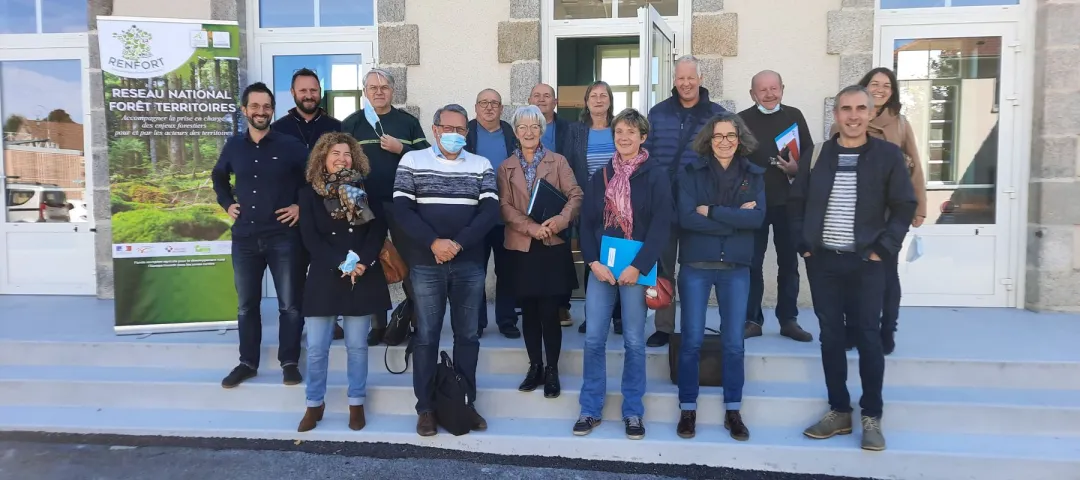General information
RDP Priority
- P1. Knowledge transfer and innovation
RDP Focus Area
- 1B: Links with research & innovation
RDP Measure
- M16: Cooperation
Beneficiary type
- Public authority / body
Summary
The RENFORT project is funded by the Réseau National Forêt et Territoires (National Network for territories and forests). This broad initiative aims to support local authorities in developing and enhancing forest lands while preserving agricultural land. As part of the RENFORT project, two chambers of agriculture and four municipalities from the Nouvelle-Aquitaine region worked together to improve their public policies on forestry.
Haute-Vienne County faced challenges regarding the identification and availability of lands dedicated to forestry compared to other French territories. The RENFORT project helps local elected representatives and civil servants develop concrete tools to support municipalities in their forest and land management actions.
Results
- The project led to the creation of one operational and pedagogical guide to enhancing the development of forest lands while considering agricultural land use.
- It also enabled the creation of a serious game to test the guide with the municipalities.

Promoter
Chamber of Agriculture of the Nouvelle-Aquitaine Region
Funding
Total budget 31 313 (EUR)
EAFRD: 10 223 (EUR)
National/Regional: 13 888 (EUR)
Private/own: 7 202 (EUR)
Ressourcen
Documents
Links
Context
The RENFORT project is funded by the Réseau National Forêt et Territoires (National Network for territories and forests). This broad initiative aims to support local authorities in developing and enhancing forest lands while preserving agricultural land. The project involves collaboration with various municipalities and regions to test and implement operational tools for forestry actions.
As part of the RENFORT project, two chambers of agriculture and four municipalities from the Nouvelle-Aquitaine Region worked together in order to improve their public policies on forestry. Haute-Vienne County faced challenges regarding the identification and availability of lands dedicated to forestry in comparison with other French territories. After a diagnosis led in partnership with local elected representatives and civil servants, the partners chosen to work on concrete tools to support municipalities in their forest and land management actions.
Objectives
The project aimed to test operational tools to support municipal forestry actions in the Nouvelle-Aquitaine region in collaboration with Élan Limousin Avenir Nature (ELAN), which consists of 44 communes. The ELAN group is a collaborative initiative that brings together several municipalities to work on common projects and address shared challenges. Within the four pilot municipalities of the ELAN group (Haute-Vienne), the goals were to:
- Understand land issues, different property types and the procedures for transferring these properties to municipalities.
- Produce a shared diagnosis at the scale of the four municipalities.
- Define and implement a medium or long-term municipal land policy by integrating and enhancing the most attractive properties into the municipal estate.
The methodology developed with these territories is intended to be transferable to other areas.
Activities
The project activities in the four pilot municipalities included:
- Elaborating a territorial and shared diagnosis to identify the gaps and needs related to land use and forestry.
- Organising several meetings with elected representatives and civil servants from the ELAN group of municipalities to support them in managing agricultural and forest lands.
- Creating a serious game to test the pedagogical tools developed for the municipalities in real-life situations.
Main results
- A guide was developed that outlines all the steps needed to formulate a relevant policy and strategic approach regarding forestry and agriculture. It serves as a decision-support tool for elected representatives and civil servants. The guide includes information on land management, methods for land inventories, the transfer of private lands to public authorities and the management of agricultural lands. It references all the legal texts and important publications related to the topic.
- A serious game was designed to test the training tools developed, with a game exercise organised on 2 July 2020. The aim was to simulate the RENFORT approach through a mock municipal council composed of employees from the municipalities and the chambers of agriculture. The actual project team presented a support proposal, just as it would have done at an actual meeting, including resources, diagnostic elements, maps, development paths, a vademecum of commonly used terms and a demonstration of geographic information system (GIS) tools.
Key lessons
- This project led to a renewal of methodologies commonly used by the chamber of agriculture of the Nouvelle-Aquitaine region. It fostered a pedagogical and interactive approach (serious game), which was particularly useful in the COVID-19 context and enabled the creation of valuable tools for municipalities.
- The guide is also a valuable resource for the chamber of agriculture. The objective was to create a tool that could be disseminated and replicated by other counties or regions. From this work, they were able to identify what was useful to municipalities and the type of information they would need (operational data, description of implementation steps, etc.).
- This project was born from a need identified among municipalities and local stakeholders, which explains the strong participation despite the challenges posed by COVID-19 and remote working.
“This project offered us a methodology that could be duplicated on other topics such as wine culture. It changed our internal practices and helped us to be more efficient on similar topics related to land management.”
Annabelle Gallitre

